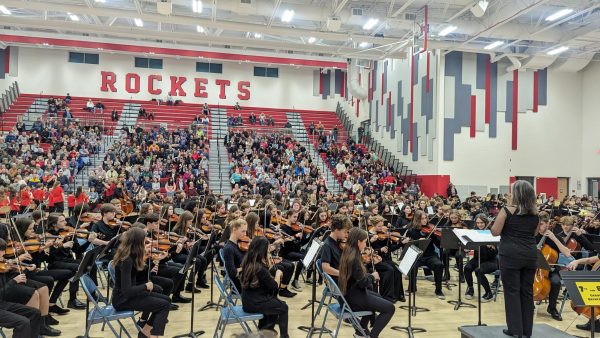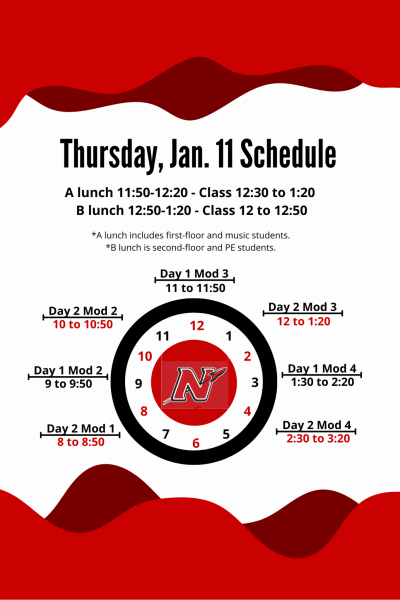Student Survey Results Indicate Underutilized Opportunities
A recent survey regarding the use of tutorial time at NHS garnered over 1,000 responses from students. Based on the results, administration staff deduced that students are not utilizing their study hall time effectively.
Associate Principal Chad Buboltz shared that this survey was conducted to see if students were taking advantage of the newly restructured tutorial time. It is observable that the current administration at NHS values student and staff feedback in response to change. Administration is aware that it has not been a smooth transition. “Kids haven’t adapted to it yet,” Principal Brian Wunderlich said.
Prior to this school year, study halls were held in lecture pits and classrooms. Now, all study halls take place in the cafeteria, which can include anywhere from approximately 60 to 150 students in one class period.
Unfortunately, some find the cafeteria to be a counterproductive environment. “It’s ridiculous,” said junior Maddie Kneeland. “I had to leave the cafeteria to finish taking my test because it was too loud.” Kneeland now spends her study hall time in the math lab. Wendy Hermans, a math teacher at NHS, shared her thoughts on the environment. “Because the new setting of the study hall is similar to lunch time, many students treat it as social time,” Hermans said.
Buboltz confirmed that the new study hall structure was designed to support the implementation of the new grading system at NHS. This grading system, often referred to as “80/20,” places a higher importance on summative assessments, which traditionally take the form of tests, projects and presentations. The remaining 20 percent is formative assessments, which include quizzes, homework and guided practice.
Additionally, the tutorial restructure reduces teacher supervision duties. Last year, each teacher at NHS was required to complete 87 duties in one semester. Now, a teacher is required to complete only 64 duties each semester. Wunderlich shared that this affords teachers the opportunity to connect with struggling students and to allow them to demonstrate knowledge via test retakes.
Students are also given more independence and freedom with the new structure of their tutorials. With permission from a supervising teacher, students may leave the cafeteria and seek help from their teachers or utilize numerous different resources offered throughout the school. These resources include a writing lab in the library and a math lab in upstairs Conant.
“I have been disappointed that more kids aren’t taking the opportunity to get help,” Wunderlich said. According to the survey, 60 percent of students spend their study hall time in the cafeteria, while 5 percent spend it in the library, less than 1 percent spend it in the math lab and no students spend it in the writing center.
Sophomore Daydre Basler commented on the change in her study hall time. “I like that you can talk in here,” Basler said. “I often find my teachers and get help.” Basler shared that, overall, she likes the flexibility and freedom of her study hall time.
Buboltz recognizes that along with more freedom comes more responsibility, but he believes that students can handle it. “Some kids are intent on doing their homework during tutorial time, and some are intent on watching YouTube videos,” Buboltz said with a chuckle. “Some students need a brain break during their day and it’s on them to get their work done.”
Math teacher Theresa Rasmussen observed that not all students can handle such freedom while still being productive. “I believe that less than 10 percent [of students] work on their homework,” Rasmussen said. According to Rasmussen, even in the periods with 60 students in the cafeteria, a majority of them are still not productive.
This survey functions as one example of how administration at NHS is strategizing to help students manage and utilize their time and resources effectively.
Administration staff met over the long-weekend to discuss solutions to the current problems with the tutorials, according to Wunderlich. Among the solutions proposed was the idea to provide a more structured tutorial time for failing students.
In the days following the meeting, Buboltz sent an e-mail to staff notifying them that administration will be implementing a more structured study hall time known as, “Silent Supervised Study,” to help struggling students. Students who have failed more than one class and/or have more than 10 tardies are no longer allowed to spend their study hall time in the cafeteria. Instead, these students are required to report to their newly assigned silent, supervised study areas. Students are required to work on homework or late work, and if they are done with both, they are expected to have reading material with them.
“We’ve already heard from some kids [Silent Supervised Study] helps them avoid distractions,” Buboltz said. “It helps hold them accountable for their work.” Buboltz’ optimism was evident and he hopes that moving forward students will better take advantage of the ample opportunities afforded to them during their tutorial time.






